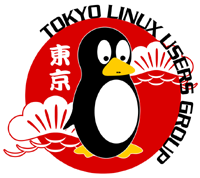from 1 Saturday, August 2, 1997
Summary of Meeting
Although there was a strong showing of the Tokyo Linux Users Group and many of the members went home with lottery prizes, quite a few of the members could not make the trip into Tokyo. The August meeting was held close to Tokyo station at Joe Marchak's office (HSBC). Three machines were demonstrated: Sparc hardware, Pentium Pro 266 mhz, and Pentium.
Following the meeting there was an excursion to Akihabara where John Little led a tour of the electric city's best bargains for used Sparc hardware. It was hot and muggy as we snaked through narrow corridors that forced us to walk single file. The stairs were high and looked shaky. The floors were grimy. The hardware was all that mattered and there were some gems among the battered cases blackened with dust. We were all mulling over a Sparc 10 with 32 megs RAM, 19 inch color monitor, and 500 meg SCSI disk that was selling for 170,000 yen.
Guest of Honor from SLLUG
The guest of honor was Mark Christensen, president of the Salt Lake Linux Users Group. He showed up as part of TLUG's International Friendship Promotion Program (TIFPP). His keynote speech focused on the international aspect of Linux and the importance of international cooperation to develop and deploy this fine operating system. In his closing remarks, Mark cited a recent article on Linux in Wired Magazine speculated on the emergence of Linux as the dominant OS for servers in the networked age.
Quick Review of Topics
XLinCity Tricks
Joe Marchak, “Mr. Xlincity,” announced that he had moved all his population offworld safely and had won the game. Joe had a tech level of over 105 and a fully solar powered society. Joe used an inspirational technique of exporting only manufactured goods and importing only raw materials. For the health of his people, Joe moved straight to solar power, leap-frogging the coal-fired power plants that causes health problems among inner-city children. He also spoke on the merits of spacing your rocket launching centers at least two blocks apart in the event of a crash that might wipe out a section of the city.
Msql versus Mysql
Mark compared msql http://www.hughes.com.au and mysql http://www.tcx.se. Mark recommended MySQL due to its greater power and stability. Mini SQL (msql) has problems with larger data sets.
Craig Oda had heard a lot about msql, but not much about mysql. After the meeting, he went on the Internet to look at both msql and mysql. He reports that msql is probably more popular due to its small size and interfaces with the web. However, mysql might be more popular in business environments. (This is just speculation). During the great Akihabara excursion, he did buy a copy of Database Programming with JDBC and Java (O' Reilly). The author, George Reese, is also the author of the JDBC driver for msql.
Copies of ADABAS D were distributed at the TLUG meeting. Unfortunately, we didn't have time to install and demonstrate it. Perhaps Yuri can demonstrate it at the next meeting?
Lilo Loader Hints
We discussed lilo chaining onto another lilo. This overcomes the limitation of 16 physical disks that can be booted. Although we didn't try this, it appears that the files in /boot/ have some significance. In the /etc/lilo.conf file there is a keyword, loader.
loader=/boot/any_b.b chain loader to swap floppy A and B
loader=/boot/any_d.b chain loader to swap hda and hdb
loader=/boot/chain.b chain loader, generic.
Since most PC hardware has a limitation of two bootable physical drives, there are some tricks needed to first load lilo than have lilo call the rest of the drives for boot. Still searching for a solution.
Caldera StarOffice
We did an install from scratch and did a full demo of the office suite. It looked good.
RedHat CDE
We demoed CDE and Craig showed some of his favorite keystroke combinations to avoid using the mouse.
RedHat Sparc Linux Install
We did an install from scratch.
ePerl
Mark spoke on ePerl. From the ePerl web site: Description ePerl interprets an ASCII file bristled with Perl 5 program statements by evaluating the Perl 5 code while passing through the plain ASCII data. It can operate in various ways: As a stand-alone Unix filter or integrated Perl 5 module for general file generation tasks and as a powerful Webserver scripting language for dynamic HTML page programming. 1997:08 08


 /
/
